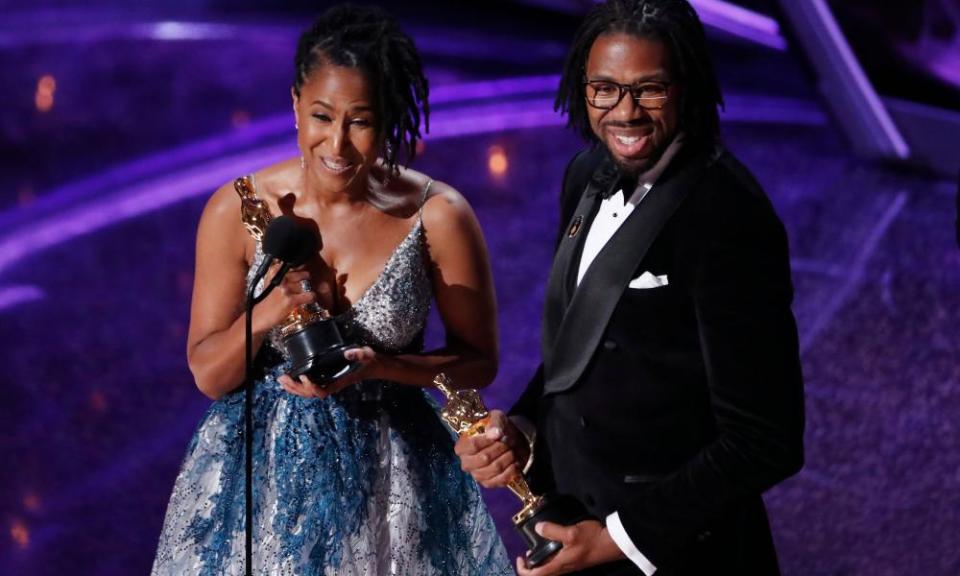What does Hair Love’s Oscar success say about diversity in Hollywood?
On its release last year, Hair Love, a sweetly poignant film about an African-American father’s efforts to style his daughter Zuri’s curls, became the latest in a handful of productions to take a deeper look at the cultural significance of afro hair. Chris Rock’s 2009 documentary Good Hair memorably critiqued the billion-dollar black haircare industry, while 2018 rom-com Nappily Ever After explored one woman’s fraught relationship with her natural hair in a society that was openly hostile towards it. It is vital that this subject continues to be explored, not least because incidents in the US, where a student wrestler was forced to cut his dreadlocks, and in the UK, where a pupil has been punished for wearing her afro, show hair discrimination is still rife.
While these films, and others like it, have received critical praise, it is Hair Love’s recent Oscar win for best animated short that has opened up a wider conversation about society’s perception of afro hair. The film was written and directed by film-maker and ex-NFL player Matthew A Cherry and funded by a Kickstarter campaign, which raised more than $200,000. David Steward II, one of the film’s producers and CEO of Lion Forge Animation, was enamoured with Hair Love from the moment he heard about it. He says: “[Co-producer] Karen Rupert Toliver mentioned this project she had that needed help getting off the ground. It ticked a lot of boxes for us in terms of the projects that we’re looking at putting out.”
Steward signed on as part of an extensive producing team, while his company provided creative resources and support. “The project moved very fast,” he says. “It was actually completed in about six weeks. We just wanted to ensure it came out the best way possible.”
Hair’s Love multitude of timely, relatable themes are what made people connect so strongly, he adds. “Depending on people’s background they can pull out different aspects of it. Of course there’s the dad-daughter dynamic. And there’s the black culture aspect, which people with the same hair related to. But then there were other people who were really touched by the cancer recovery storyline. You have this dynamic of the daughter who wants to do her hair and look her best for her mom, who doesn’t have any.”

Steward says initial screenings of the film provoked a strong emotional reaction from the audience. “You had all these folks who have great animation abilities and backgrounds, and who have worked on a number of amazing projects, coming together – and they’re all African-Americans. It was a powerful moment to see the project from its inception but also to see how we came together as a group of African-Americans in a space where there’s only a few of us. Receiving the [Oscar] award was an amazing moment.”
He also believes Hair Love has helped socialise the black experience, “not only with the daughter, but with the father having dreadlocks. It has helped spark a conversation about what are acceptable norms around hair.”
Hair Love’s success is hugely welcome but there still need to be more opportunities in Hollywood for black people to tell their stories on their own terms, as this year’s Bafta row shows. When no people of colour were nominated in the main acting categories, many feared the same outcome at the Oscars. However, on the night, Hair Love was among a handful of triumphs for people of colour, including Taika Waititi and Parasite director Bong Joon-ho.
“The Oscars diversity debate is valid,” says Steward. “It’s been a very on-again, off-again conversation … there needs to be some consistency. But I also think there needs to be more content coming out of diverse communities. The more [projects] we have out there, the more opportunities there will be for awards shows to pick them.”
Steward’s belief that there needs to be more talent coming through the pipeline is shared by Dionne Miller, the CEO and founder of Griot Gateway Productions, which raises awareness of the need for diversity and inclusivity in arts and entertainment. Its post-Oscars gala celebrated Steward and many others for their work in the industries.
Says Miller: “I feel that diversity starts from the inside out, meaning that in the film industry it has to start with the talent agents, production companies and financing companies. If you don’t have a team of diverse individuals to push the needle, then you’re not going to get the result that we’re all looking for. Certainly there are strides being made, but there’s more work to be done.”


